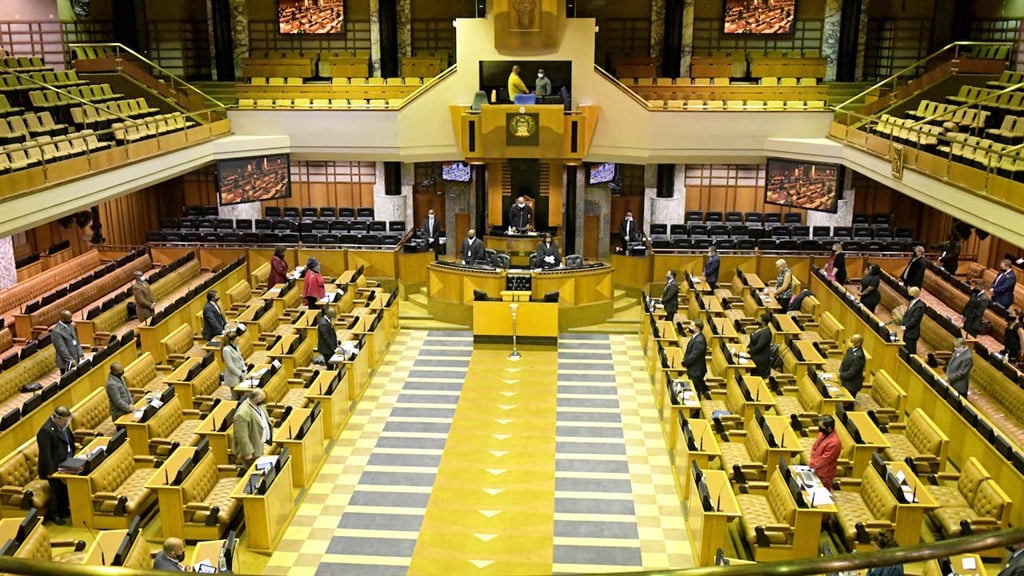
Society has effectively been left for dead in part due to an interplay between bad politics and prevailing public discourse, write Thembinkosi Gcoyi and Zamokwakhe Ludidi Somhlaba.
This year South Africans will once again have the opportunity to elect councillors of their choice in their respective localities when they cast votes in the August local elections.
Various political parties will, as always, be vying for the favours of the electorate seeking the mandate to implement their public policy agenda.
The local elections will take place against the backdrop of the havoc unleashed by Covid-19 on lives and livelihoods, which has exacerbated the negative economic growth recorded since the latter part of 2019, worsening poverty and unemployment, and a generally bleak outlook for the country.
South Africans are seized with these issues as they naturally should be.
While people’s views about where the country is vis-à-vis the society we aspire to become are, to a large degree, influenced by their lived experiences and a set of other considerations including ideology, there is an extent to which an interplay between bad politics and prevailing public discourse is producing a counterproductive result for society.
This result is the seemingly irreversible trend of elevation of speculative inferences and falsehoods to a body of knowledge upon which society, and its constituent parts, must necessarily exercise choices.
Poor policy choices
Let us put this into context.
The ANC will most likely point to its 26-year long experience in government and the many successes it has recorded. The caveat will be that, given the magnitude of the wreckage of colonialism and apartheid, the party never had the illusion that it would reverse the country’s historical legacy of poverty and inequality overnight.
For other political parties, including some societal formations and individuals, many of the problems faced by South Africa today are attributable to poor public policy choices of the ANC, bad governance, and corruption.
Though both sides of the narrative about South Africa today are correct to some degree, they are often used as ‘truths of convenience’ or blame shifting.
On the one hand, talking about what the ANC has achieved in government versus what it could have conceivably achieved had it made wise public policy choices and taken firm action against mismanagement and corruption in the public service, is often dismissed disparagingly as counter-revolutionary, if not a false narrative sponsored by White Monopoly Capital.
On the other, for those with centre-right political learnings raising concerns about persistent racism and socio-economic inequalities between blacks and whites is an archaic left rhetoric that shields the failures of the governing party and poor judgement on the part of the electorate that has consistently voted the ANC to power.
Accordingly, our body politic is found wanting when it comes to a genuine contestation of ideas about the society we aspire to become.
Alternative facts
It is increasingly descending into a spectre of public fraudulence, replete with a gamut of slurs, vague generalisations, and factual inaccuracies.
Our political parties’ continued relevance, and that of individuals within those parties, seems to hinge upon a potent fusion of unfettered subjectivity and lies, as well as the extent to which such fusion is easily sold and believed. This results in artificial epistemological justifications for manifestations of political behaviour in society.
Political behaviour and the social outcomes it produces are so wedded together that they reinforce each other in a dialectical relationship of accommodation and disagreement over what is considered truthfulness or otherwise of phenomena, depending on the timing of such phenomena and by whom it is accounted for.
What was true yesterday is easily dismissed as false the following day, as influential political figures vacillate between competing alternative facts to advance their own interests.
In this, society seems to have been effectively crippled and left for dead, as some of its segments have surrendered their intellectual sovereignty in favour of political correctness and possible opportunities flowing therefrom.
Public discourse is often reduced to a zero-sum exercise wherein the advancement or defence of a particular position is forcefully presented as the only account there is, with no possibility whatsoever of listening to and hearing the other side.
Take the question of former President Jacob Zuma and his run-ins with the law on the one hand, and racism on the other, as examples of dishonesty in political and public discourse.
READ | Karyn Maughan: Zuma won't pitch at state capture inquiry and his silence will end up hurting him
Although the ANC-led Tripartite Alliance, along with the Economic Freedom Fighters, has a general aversion – theoretically at least – towards Capital, the grouping that is aligned with former President Jacob Zuma is unable to even pause for a moment to reflect on his past and present shortcomings. The only account they advance in his defence, and would have us all believe there is, is that Zuma is a victim of a political conspiracy.
The latest fiasco surrounding Zuma’s defiance of a Constitutional Court ruling directing him to subject himself to the Zondo Commission of Inquiry into State Capture, and the subsequent political crisis this has generated in the ANC, has laid bare the lengths to which his supporters are willing to go to opportunistically blame Capital, and those they consider to be its enablers in the party and government, for all the political and socio-economic woes besetting South Africa today. For them, criticising Zuma is tantamount to exonerating former Presidents Nelson Mandela and Thabo Mbeki, Capital or apartheid, or to suggesting that President Cyril Ramaphosa is a perfect president.
On the face of it, by resorting to innuendos and ‘as yet’ unsubstantiated allegations each time he has to account does seem to give credence to the assertion that former President is, in fact, making up stories up as he goes.
Rhetorical
By invoking the revolutionary utility of blackness while at the same time placing the blame squarely at the door of Capital, Zuma is appealing to black masses the majority of whom remain disaffected by the economic outcomes of our 1994 democratic breakthrough.
Despite often being referred to as a champion of radical economic transformation, Zuma, as many would agree, never had any known RET programme. His championing of the RET has always been more rhetorical than anything else. Yet, he and some in society so easily absolve the ANC and his presidency of any responsibility in failing to extricate millions of blacks from the claws of poverty.
Zuma was a president of the Republic for nine years. How some segments of society accept his narrative that only Capital should be blamed for our country’s woes is most puzzling, to say the least; for it alone cannot sufficiently explain why South Africa is in the difficulties it is in today.
Another issue that paralyses public discourse in our country is that of race and its relevance in understanding South Africa today.
Generally black people believe that racism, along with white privilege, is alive and thriving in South Africa. For whites, the subject is an uncomfortable one. When they enter the debate they do so from a position of defence, without ever accepting any responsibility for past and current manifestations of racism.
Take eNCA’s defence of its reporter, Lindsay Dentlinger, who treated black and white political leaders outside parliament after the delivery of the Budget differently, as an example. While it is possible that Detlinger may have yielded to the power of her inherent, race-based bias in her treatment of these political leaders, it was unforgivable that the eNCA elected to defend her in the manner it did, emphasising her journalism experience to the total disregard of the racial connotations of her actions and the immediate harm inflicted on black South Africans.
READ | Tinyiko Maluleke: The #LindsayDentlinger saga: Was the eNCA reporter racist?
Political parties such as the Democratic Alliance, Freedom Front Plus, and lobby group AfriForum are also guilty of downplaying racism and its impact on society.
More often than not they conveniently blame the ANC and the EFF as provocateurs of racism for political ends.
The import of this denialism is that were the ANC and the EFF, along with millions of black South Africans, to keep quiet about racism the problem would immediately disappear. Of course, this is verifiably untrue.
Every day black South Africans are subjected to some or other form of racism, blatant or subtle, irrespective of whether or not they speak about it. And to the extent that racism thrives on power and privilege enjoyed by the white population to this day, its resolution lies at the very core of our country’s national question.
Denialism and counter-accusations
To understand the historical dimension of the problem of white power and privilege, one needs go no further than observing that blacks and their white counterparts continue to occupy polar opposite ends of the economic spectrum: black poverty versus white opulence.
While accepting that the ANC government should be criticised for acting sluggishly in economically lifting black people, such failure does not in itself negate the fact that racism and white privilege are an epochal consequence of colonialism and apartheid.
Any view to the contrary borders on some form of the fallacy of composition to the extent that it confuses original causation with the contributing role of the ANC.
The grand denialist stance amplified by the DA’s extraordinary decision at its policy and federal conferences last year to scrap race as a criterion for redress feeds into this dishonest narrative. After years of flipflopping on the issue of race, at one time acknowledging “race as a proxy for disadvantage” but then reverting to a neo-conservative stance the party aligned with disaffected white voters who dumped the party in favour of the FF+ in the 2019 general elections.
Denying historical facts and the persistence of racism is as much of dishonesty as suggesting that ANC leaders charged with corruption, or EFF leaders suspected of the same, are being pursued by Capital and its agents.
This denialism and counter-accusations are at the core of our degenerating sociology of the public discourse, as the broader society is inadvertently entangled in multiple forms of falsification where respect for the truth has been replaced by intellectual inertia and concomitant acceptance of any statement or behaviour that validates our individual pre-conceived, biased conclusions about the other.
In the end we fail to have an honest conversation about our country and its future.
- Thembinkosi Gcoyi is the Managing Director of Frontline Africa Advisory. Zamokwakhe Ludidi Somhlaba is the Political Risk Advisory and Research Manager.
*Want to respond to the columnist? Send your letter or article to opinions@news24.com with your name and town or province. You are welcome to also send a profile picture. We encourage a diversity of voices and views in our readers' submissions and reserve the right not to publish any and all submissions received.
Disclaimer: News24 encourages freedom of speech and the expression of diverse views. The views of columnists published on News24 are therefore their own and do not necessarily represent the views of News24.




 Publications
Publications
 Partners
Partners























